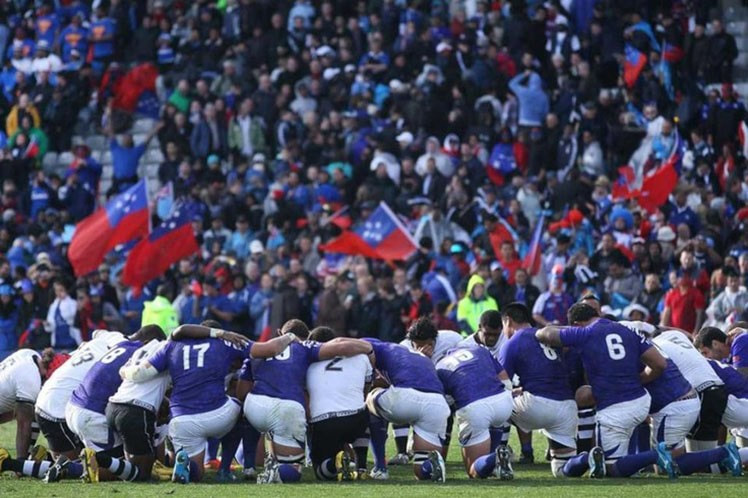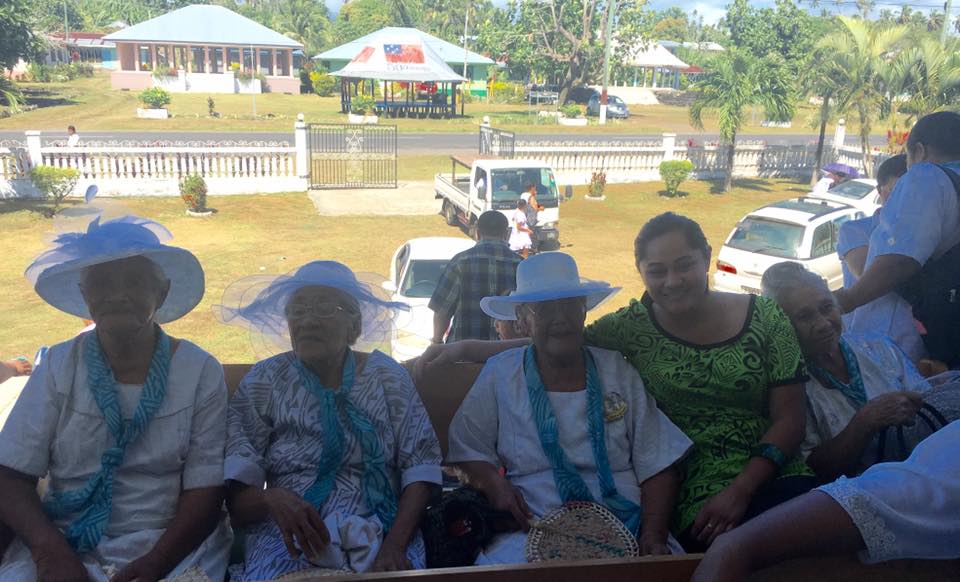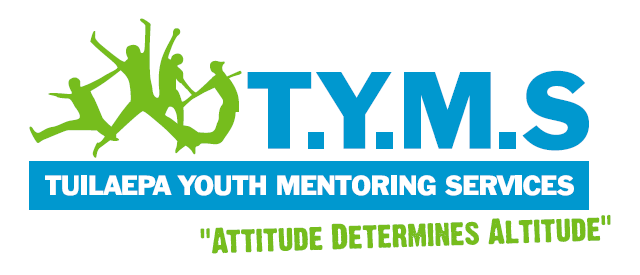|
Author: Koleta Savaii  I purposefully left this blog until near the end of this wellbeing series because I didn’t understand it well enough to write about it. If I don’t know why or what role ‘spirituality’ plays in attaining wellbeing, how can I suggest it to others? Just before the Christmas holidays, my partner and I split. Nobody warned me that I would spend my holiday alone, in bed, crying myself to sleep. But it happened. And I lived through it. I mention this personal experience because it was only at my darkest hour that I realised why God mattered, and why spirituality is important to many Pacific peoples conceptions of well-being. If you think prayer only happens on Sundays, wait until you live in Samoa! Growing up in Samoa, God and church was a normal part of life. I never realised that it didn’t have to be that way until I lived on my own in busy Auckland city. My alarm clock every morning of the week was my grandfather’s radio. It was constantly tuned into Radio 2AP, the ‘voice of the Nation’. At 6am daily, Radio 2AP would start off its broadcast with a morning service conducted by a fa’afeagaiga (pastor) from one of the many churches in Samoa. I could pretend to sleep in if I wanted, in fact, that’s what happened most mornings. But, like a normal alarm clock, there’s only so many times you can hit the snooze button. As soon as the morning service ends, the radio turns off, and my grandfather starts singing ‘Fa’afetai i le Atua…’ (EFKS church hymn). A minute later, my grandmother joins him. And then all the lights come on, the aunts and uncles and cousins and sometimes the neighbours sing along, and you have no choice but to wake up. Also, sitting up for prayer was a lot easier than the lecture that came after if you had decided to sleep in. Then after morning prayer you go about your day knowing that “you are guided and protected by God’s grace”, my grandfather used to say. And in the evenings, no matter where you are, you always make sure you make it home for evening faigalotu (prayer). I guess it helped that every village had an evening curfew that reinforced this. The only exception to the rule was when you were at the pastor’s house for song practice or one of the many church activities you were expected to be a part of. I never realised how much my life revolved around the church. Was I spiritual? No. I was born into that life. It was all I knew. I was a member of the aufaipese (church choir), Sunday school, and church youth. I attended a Mormon school during the day, and aoga faifeau(pastor’s school) in the evenings. One can never have too many church associations. Looking back, I never realised how much my life revolved around the church. Was I spiritual? No. I was born into that life. It was all I knew. Fast forward to my early adulthood years where I lived on my own in New Zealand. Sundays were like any other day of the week. I had to work if I was rostered, or my rent wouldn’t get paid. My grandparents weren’t around to give me the ‘lecture’ for not attending church. In university I was taught “other” ways of seeing life. Religion, like science, was just another perspective into life. No longer did I feel guilty about my new lifestyle. After all, everything was a choice, including believing in God; or so I thought. My story isn’t unique to me. My research and everyday conversations with other Pacific youth in New Zealand, tell similar experiences. For me, my “ways of being”, the way I was raised and the life I lived in Samoa as a teenager, conflicts with the lifestyle that is available in my new environment. For many New Zealand-born and raised Pacific youth, it is their parents “ways of being”, or their island cultures, that conflicts with the cultures that many of our young people are exposed to (and have embraced) here in New Zealand. Cross-cultural psychologists Hazel Markus and Shinobu Kitayama suggest viewing “wellbeing” as a combination of what “being” is, and what “being well” means. Thus, to realise what wellbeing means to a group of people, we need to first understand their “ways of being”. The place of the spiritual in Pacific life is paramount; it is present in daily activities such as fishing, cooking, and weaving, to travel, dancing, perceptions of what is good health, and what is required to attain a good life. In many Pacific communities, wellbeing is understood to be a consequence of harmony and balance between the three interrelated and interdependent elements of Pacific life: the spiritual, the social, and the physical. Pacific peoples see their place in the world as connected to God their creator (spiritual), and with their natural environment and resources. In Samoa for instance, it is believed that God appointed matai’s(chiefs) to govern Samoa, and he also allocated land to each family, and the sea resources for people’s security and nurturance. The place of the spiritual in Pacific life is paramount; it is present in daily activities such as fishing, cooking, and weaving, to travel, dancing, perceptions of what is good health, and what is required to attain a good life. I am not a rugby fan, but my favourite moment of the 2011 Rugby World cup was that time after the Samoa and Fiji match where the boys formed a circle in the middle of the field and prayed. It is common practice to start and end every activity with a prayer. This also reminds of an incident back in 2014 when I was working for the Ministry of Police in Samoa. I missed our daily devotion one morning because I wanted to get an early start on my case load for the day, and when I walked into the office later in the day, excited to tell my superior about some new evidence I had discovered, I was greeted with a “you start the day with God and you end the day with God” lecture. When a child is successful in school, or gets a promotion at work, or when a family wedding or funeral ends on a high note (i.e. where everybody goes home with a full stomach and extra food plates for the road), you will often hear people say ‘mo le viiga o le Atua’ (for the glory of God) or ‘viia le Atua’ (praise the Lord). These are a few snapshots of your everyday Pacific “ways of being”. Spirituality isn’t only about believing in God and attending church every Sunday. It is part of people’s everyday tasks and routines. It is a way of life that is guided by the worldview that to be well is to maintain harmony in your relationship with God, your family and community, and your environment. And this is relatively easy to uphold in the homelands, where cultural norms, rituals, and practices are underpinned by this philosophy. In New Zealand’s multi-cultural society, the task is a bit tricky. But the place of the spiritual is still evident among our Pacific communities here. You go to Avondale race course on a Saturday night and you’ll find people playing housie, hosted by a Pacific church, to raise funds for a church building or activity. You drive around South Auckland (home to the largest Pacific population) on a Sunday afternoon and you see Pacific churches filled with attendees. The ongoing New Zealand Youth2000 study also reveals the high number of Pacific youth rating spirituality as important in their lives, in comparison to other ethnic youth groups in New Zealand. Evidently, for many Pacific peoples, the place of the spiritual in attaining wellbeing is still paramount, despite being far removed from their homelands. I am writing this from underneath Grafton bridge on a cloudy Sunday afternoon. I didn’t go to church today. But I’m okay with that. I’m still Samoan. I believe in God and I know that He loves me, because at my darkest hour, I called out to Him and I was comforted. My best friend visited me in Samoa in 2014 and on the same Sunday afternoon, in different locations, both our mothers gave us the ‘toe alu tasi i le Alii’ (go back to God) lecture. I have a feeling they meant ‘go back to church, and youth, and church choir’ … but I think praying and surrendering control to God through prayer, is good enough for them too.
1 Comment
|
Categories
All
Archives
June 2018
|
What Our Clients Are Saying
|
Contact Us |


 RSS Feed
RSS Feed
